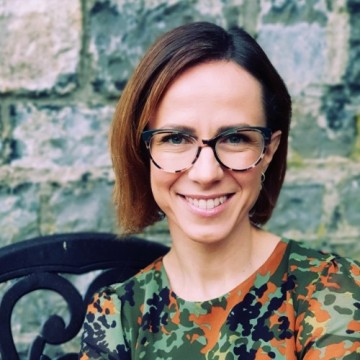
Posted by
Aleksandra Durand-MacHere2Coach
hello@here2coach.ie
Tips from an Interview Performance Coach
Preparation tips to help maximise chances of securing your dream role.
Recruiters & HR professionals are experts at advising others but often struggle when it comes to their interview preparation. You've interviewed hundreds of people, so you'll either take shortcuts in your preparation or overthink everything. Aleksandra Durand-Mac is an Interview Performance Coach, and we asked her to help.
Aleks has over ten years' in-house recruiting experience with LinkedIn, PayPal, eBay, and Google. She launched her own interview coaching business, Here2Coach, to help people maximise their chances of securing their dream role. Here are some of her thoughts to help with your prep:
Becoming interview ready
Don't leave your preparation for the night before an interview. You'll be more calm, confident, and natural if you give yourself extra time to reflect on your career. Here are some tips to help bridge the gap between the "every-day you" and the "interview-ready you."
Think about what makes you successful. It is interesting how many of my clients find this question challenging. They are assuming and guessing rather than answering with conviction. Ask yourself:
- What are you passionate about?
- What gives you a great sense of joy, and why?
- Why do your stakeholders love you?
- Why do colleagues ask for your guidance?
- Why did your manager put you on a shortlist for promotion?
The recurring theme I see with my clients is that they can easily talk about their operational expertise but struggle when it comes to knowing themselves or comfortably talking about it. It is such common practice to focus on the job description, research of the company, that the true "I" can be neglected. These questions are often answered generically with little genuine insight. Your authentic "why" will make you stand out and differentiate yourself.
I’ve written a more detailed blog about the topic of always being interview ready with six practical steps which you might find useful.
The importance of storytelling
Storytelling might sound a bit cliché, but it is so vital when it comes to interview preparation. Concise, structured stories allow you to attach emotion and passion to your career to bring everything to life. By definition, storytelling forges connection amongst people. Like any other skill, storytelling can be learned and developed.
The two most effective techniques to practice storytelling in an interview is the STAR or CARL technique. You have likely advised your candidates to use this approach, so take your advice and don't give high-level unstructured examples. I am a big fan of the CARL (Context - Action - Result - Learning) technique as it emphasises your ability to reflect. To wrap up your answer with impact and make it more memorable, ask yourself these questions:
- Why have I picked this particular example?
- What have I learned from this situation?
- How has this experience made me change my view?
Don't cut out the feelings and use expressions that reflect exactly how you felt in those situations. Use language like "I loved how that conversation made me change my mind on..." or "I felt quite frustrated initially but continued with the project…". This allows the interviewer to get a more rounded picture of you and your personality. Growth mindset is key in recruitment, and no fellow recruiter is expecting someone to be perfect. It's ok to make mistakes, own up to them, be humble, and show how you learned from them.
Use your insider knowledge
You've probably interviewed thousands of candidates in your career and had countless conversations with your hiring managers on why they selected a candidate over another. You've heard numerous times why someone who, in your view, was an excellent match, just did not cut it.
Work backwards. Think of all those conversations, and some solid reflections will start to surface for you. Why was candidate A far more experienced yet far less impressive than candidate B? What made the Hiring Manager willing to "take a risk" and moving to offer with candidate C despite them missing the point from the "must-haves" list?
Take all of these reflections and analyse your prepared examples. Could you be more concise? Are you genuinely excited about the example you picked? Are you being honest or cringing at the idea of selling yourself?
In conclusion, to strengthen your chances of success think beyond the standard type of preparation. There are always different angles than can give you an edge. Do you have a personal affinity with the brand, and are a brand ambassador already? Have you found things in common with the interviewer when researching their profile? Find a good time to mention it during the interview, and your chances of being more memorable will be higher.
